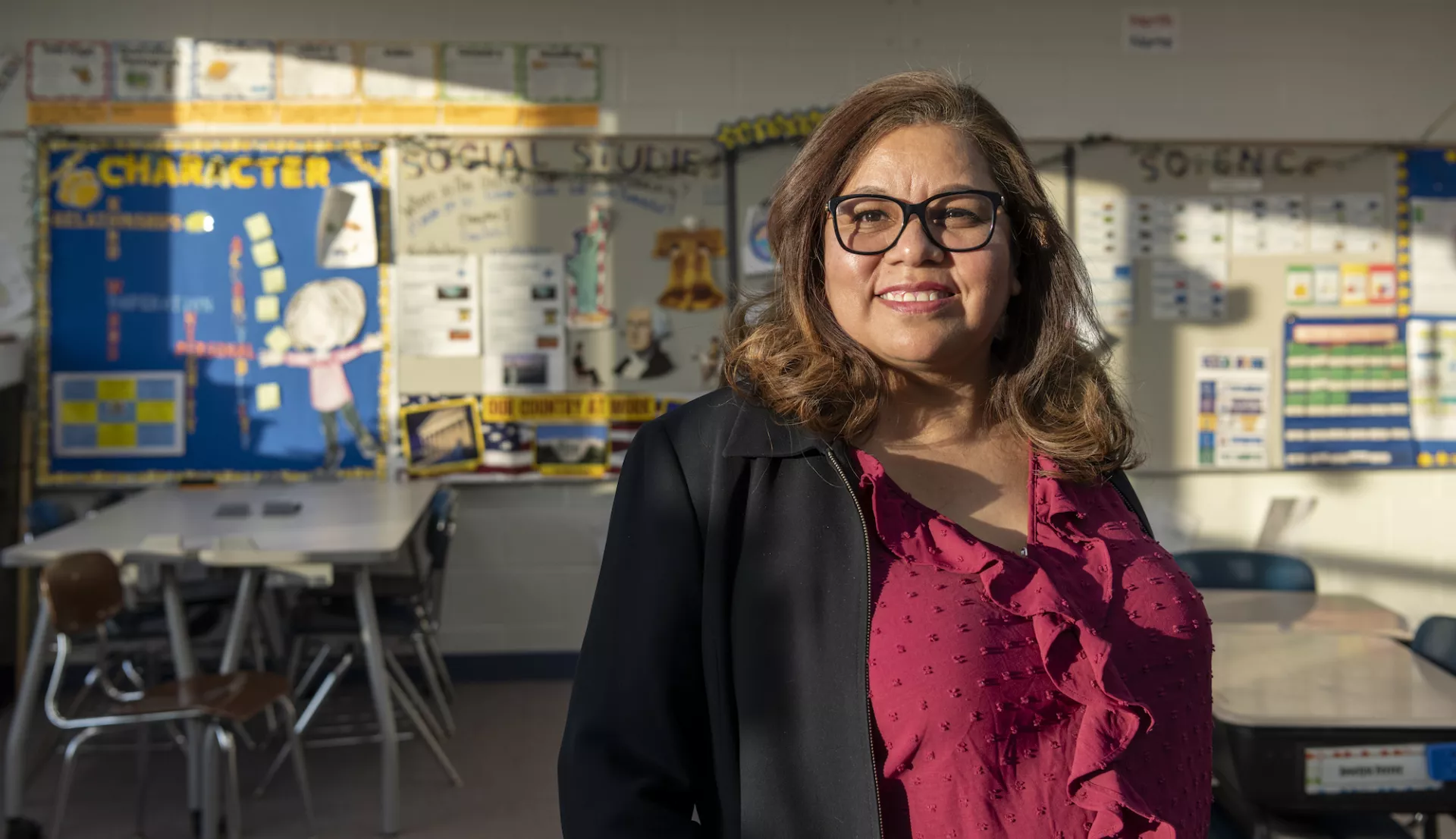
Key Takeaways
- Elected leaders make countless critical decisions about public schools. That's why it is important that educators have a voice in the process, or better yet, a seat at the table.
- A growing number of educators are running for office at the local, state, and federal level.
- Through its See Educators Run program, NEA is prepared to help members who are ready to run or considering putting their skills to use in the civic arena.
What inspires an educator to run for office--to go from one demanding job to another?
In 2012, Joe Miller was teaching high school social studies, coaching, and mentoring. He and his wife (a fellow teacher and union member) had two young sons. He was busy and content. But when members of his Amherst, Ohio, community asked him to run for City Council, the idea was hard to dismiss.
“Educators are problem-solvers. We have empathy and we want to help,” Miller says. “That’s part of what makes us successful in the classroom, but it’s what makes a good elected leader, too.”
Ultimately, he felt compelled to run. Like a growing number of educators, Miller was twice called to public service—first in a classroom, and then in elected office.
While the precise number of educators holding public office is hard to pin down, NEA estimates that there are thousands of current and retired educators serving on school boards, city councils, and other legislative bodies. Some serve at the state level, as legislators or even as governor. Minnesota Gov. Tim Walz was a high school teacher and union member. And Rep. Jahana Hayes, a Connecticut teacher, won re-election to the U.S. House of Representatives in November.
Running for elected office is never an easy decision. But NEA is prepared to help members who are ready or considering putting their skills to use in the civic arena.
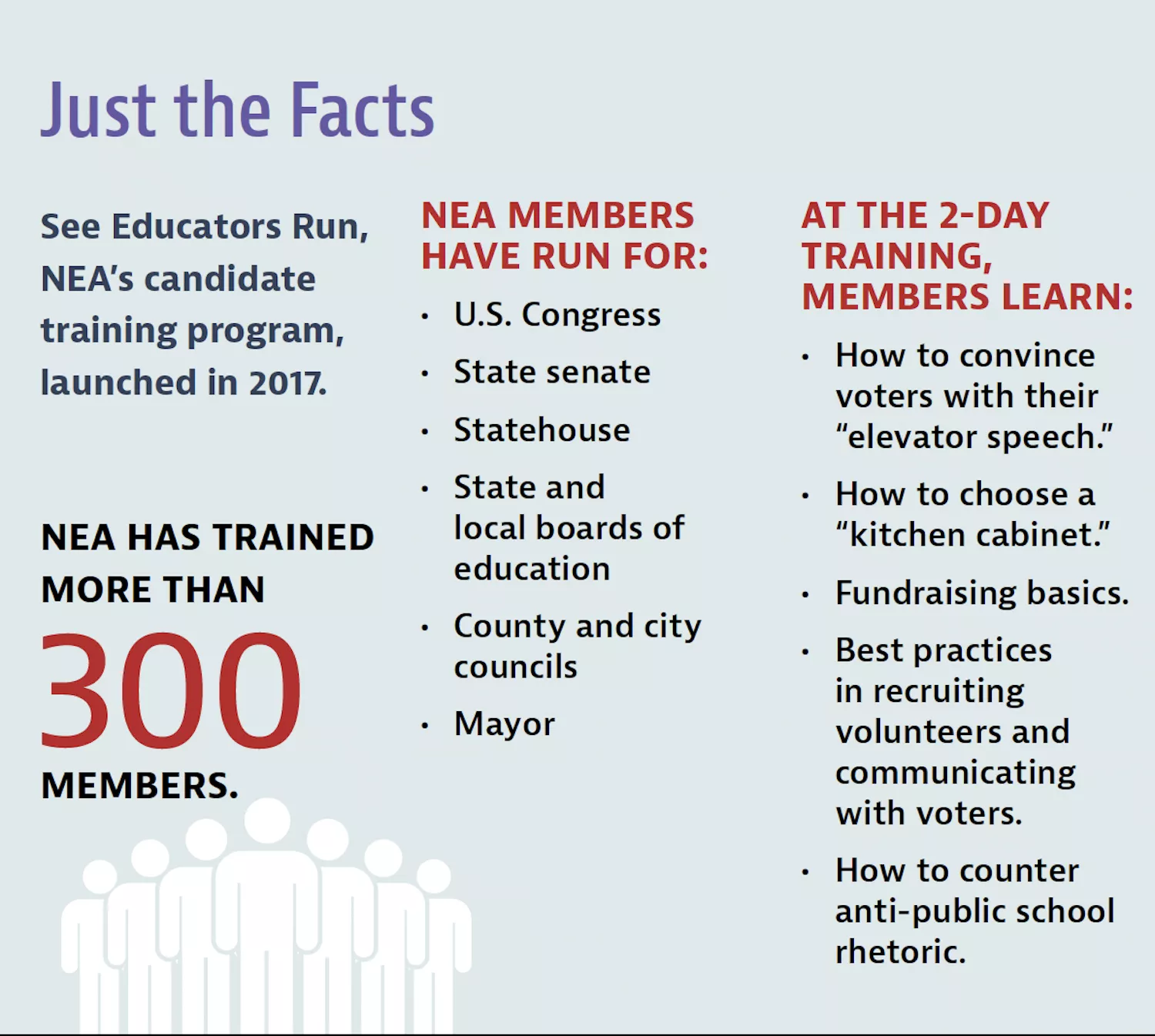
The Run
Joe Miller lost his first election. “I came to the ballot late and ran as an independent. I learned from my mistakes—I would end up running for the seat successfully three times,” he says.
“There’s a learning curve when it comes to running for any office,” Miller adds. “You have to be taught how to do it, or learn the hard way.”
Fortunately, shortly after the political director at the Ohio Education Association helped convince him to run for the state legislature, Miller had the chance to attend See Educators Run, NEA’s candidate training program.
“See Educators Run really provided me the tools I needed to run a much larger campaign,” Miller says.
“The beauty of the program is that it helps educators make use of the skills they already have in delivering a clear message and educating people about complicated issues. The program fills in the gaps on things like fundraising, field work, messaging, and networking,” which might be new to educators, Miller says.
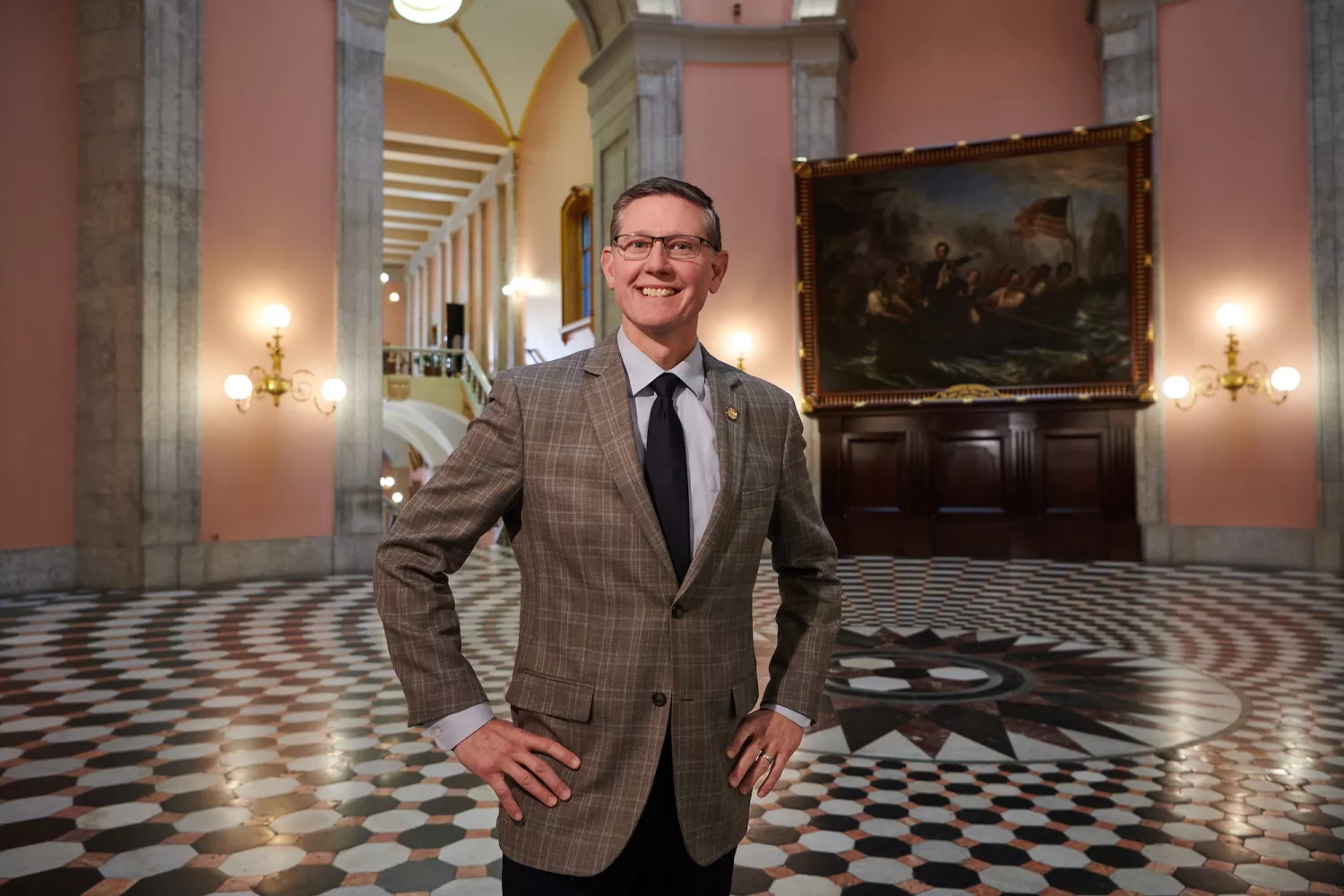
Miller won that race, and was re-elected to the seat in 2022.
Third-grade teacher Elizabeth Ojeda-Jiménez , who specializes in bilingual education, says attending See Educators Run would have saved her from a lot of missteps the first time she ran for school board.
“I didn’t even know I needed to get signatures to get on the ballot,” she says. “I had to figure out everything as I went.”
Fortunately, Ojeda-Jiménez won anyway, which she attributes to the strong support from her community, in Berwyn, Ill., including a group of former students.
“They were so helpful and funny, they introduced me to people as their teacher,” she says. “We knocked on doors every day for at least one hour, and a couple of hours on the weekends.”
Her election know-how expanded even more after she attended See Educators Run in 2017.
“See Educators Run taught me to calculate my win number—how many votes I would need to win—prepare an elevator speech, and form a slate of other people to run with,” she says. “It helped me later run for alderman, though I didn’t win that race, and trustee, which I did win. Now I’m running my third campaign for school board.”
Know Your ‘Why’
Ojeda-Jiménez has advice for educators who want to run for office: “You have to know your ‘why.’ Whatever got you to run in the first place, that’s what you need to think about when things get tough.”
Her “why” is to be a voice for Latino residents, who make up a large portion of the community and had never had representation on the school board.
Before Ojeda-Jiménez earned her teaching credential in 2014 , she was a paraprofessional who assisted science teachers working with English language learners.
“I came to the U.S. from Mexico at the age of 10,” she says. “I was that student who didn’t speak any English and was from a different culture and was not able to understand what was going on. It was difficult for me to assimilate. I wanted to be that person who helped these students navigate their new culture.”
She wanted those students to have at least one teacher who looked like them—so she went back to school to earn her credential. During her campaigns and as a public official, those students and their families are her inspiration.
Joe Miller had no shortage of inspiration when he first ran for state office in 2018. Miller longed to take a stand against the corruption and fraud that had depleted state education funds. The Electronic Classroom of Tomorrow (ECOT) charter scandal alone cost the state well over $100 million.
But Miller knew that running for the state legislature would come with sacrifices. He would have to give up his teaching position and wouldn’t receive a full retirement. He would also be a two-hour drive from home for half the week while the legislature was in session in Columbus. He would miss out on time with his now-teenage sons.
“The beauty of the program is that it helps educators make use of the skills they already have in delivering a clear message and educating people about complicated issues. The program fills in the gaps on things like fundraising, field work, messaging, and networking.” — Rep. Joe Miller
“My wife and I knew what was going on in Columbus, how our lawmakers kept Ohio in the race to the bottom. We were watching the general assembly defund and decimate public schools,” he says. “Eventually I asked her, ‘What do you think? Should I go and advocate down there?’”
They decided together that he should.
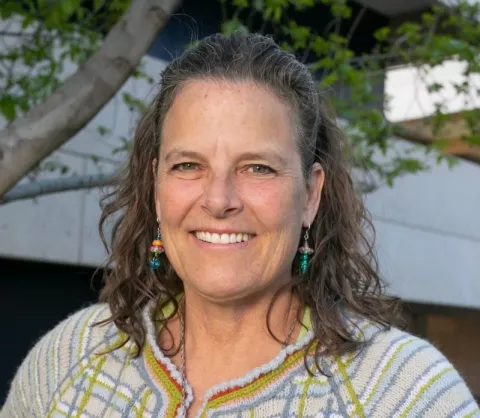
“We need more teachers to be involved,” says Theresa Riel, a retired Pima Community College professor.
"It’s not like we’re afraid of the hard work—because gosh, teaching is the hardest profession out there!” says Riel, who was elected in November to the Pima Community College governing board. “This is a way to make a difference. Instead of shaping young minds, you can shape policy."
Former Arizona teacher Julie Cieniawski, who retired in 2018, was so concerned about the policies of the Scottsdale Unified School District school board that she ran for a seat in 2020.
The competition was intense. She faced off against five other candidates in a divisive race that focused on the future of the district’s 30 schools.
“A majority of governing board members didn’t even send their kids to our schools and actually were trying to dismantle them. My focus was on moving forward. I knew our kids deserved better.”
Her hard work and dedication paid off. Cieniawski won.
The Good Fight
Most education decisions are made at the state and local level. Too often, those governing bodies have not included educators or people with a high level of experience with public schools.
The value of having educators at the table when policy decisions are made is immeasurable.
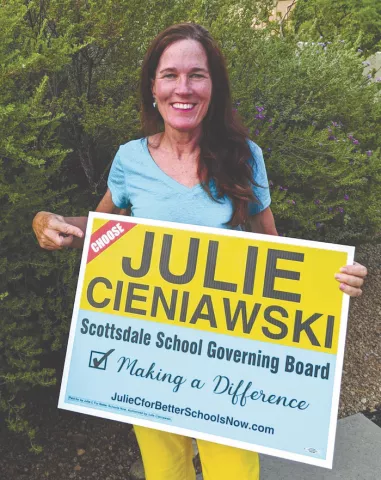
Cieniawski worked with several other newly elected pro-public school members to reverse policies that had cut staff and discontinued recognition of the district’s three unions.
“Our public schools deserve to be revered,” she says. “Now more than ever, our communities need glue to pull us together. Our schools can be that and more.”
The outlook in Ohio isn’t yet as sunny. But Rep. Miller, a Democrat, says that although his party is now in the “superminority,” his position gives him a voice .
“We’ve got General Assembly members using talking points from Americans for Prosperity and ALEC [groups that peddle deceptive model bills to state legislators around the country]. Outside entities and forces are coming into the state saying you need to defund, delegitimize public education, and make it for-profit,” Miller says. “So my job has been to stop and educate and fight back as much as possible.”
Some of that happens in committee meetings, and some in informal conversations. And of course Miller introduces bills.
“I have a bill right now to create funding models to help create community schools, so that they would have wraparound health and social-emotional services,” he explains. “At least I can show that there are ways to fix the problems that these children bring into the classroom.”
—James Patterson contributed to this article.
________________________________________________________________________________
THIS IS WHAT WINNING LOOKS LIKE!
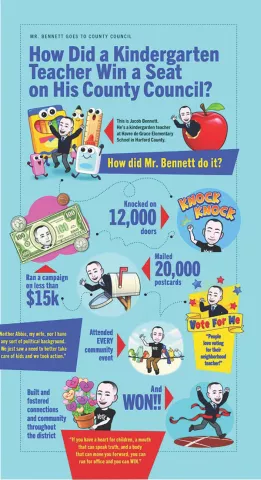
Kindergarten teacher Jacob Bennett says he and his wife, Abbie—a fellow educator—had spoken for years about the need for change on their local County Council, in Harford County, Maryland . With a filing deadline on the horizon, they realized that if they really wanted that change, one of them would have to run.
Jacob Bennett filed as a candidate , but he had to figure out how to run a strong campaign. So he turned to NEA’s See Educators Run program.
“It was incredible and foundational to me, learning how to run the campaign,” he says.
The training helps candidates determine the number of votes they need and offers strategies to win over voters.
“I couldn’t recommend that program enough to anyone in the union looking to take political action.”
NEA gave him the skills, but Bennett put in the work. It paid off: Bennett flipped a Council seat. The person he replaced had supported a budget that cut hundreds of teaching positions, leaving the county with the worst student-teacher ratio in the state.
Bennett has stayed strong while opponents have challenged his eligibility to serve because he is a teacher.
